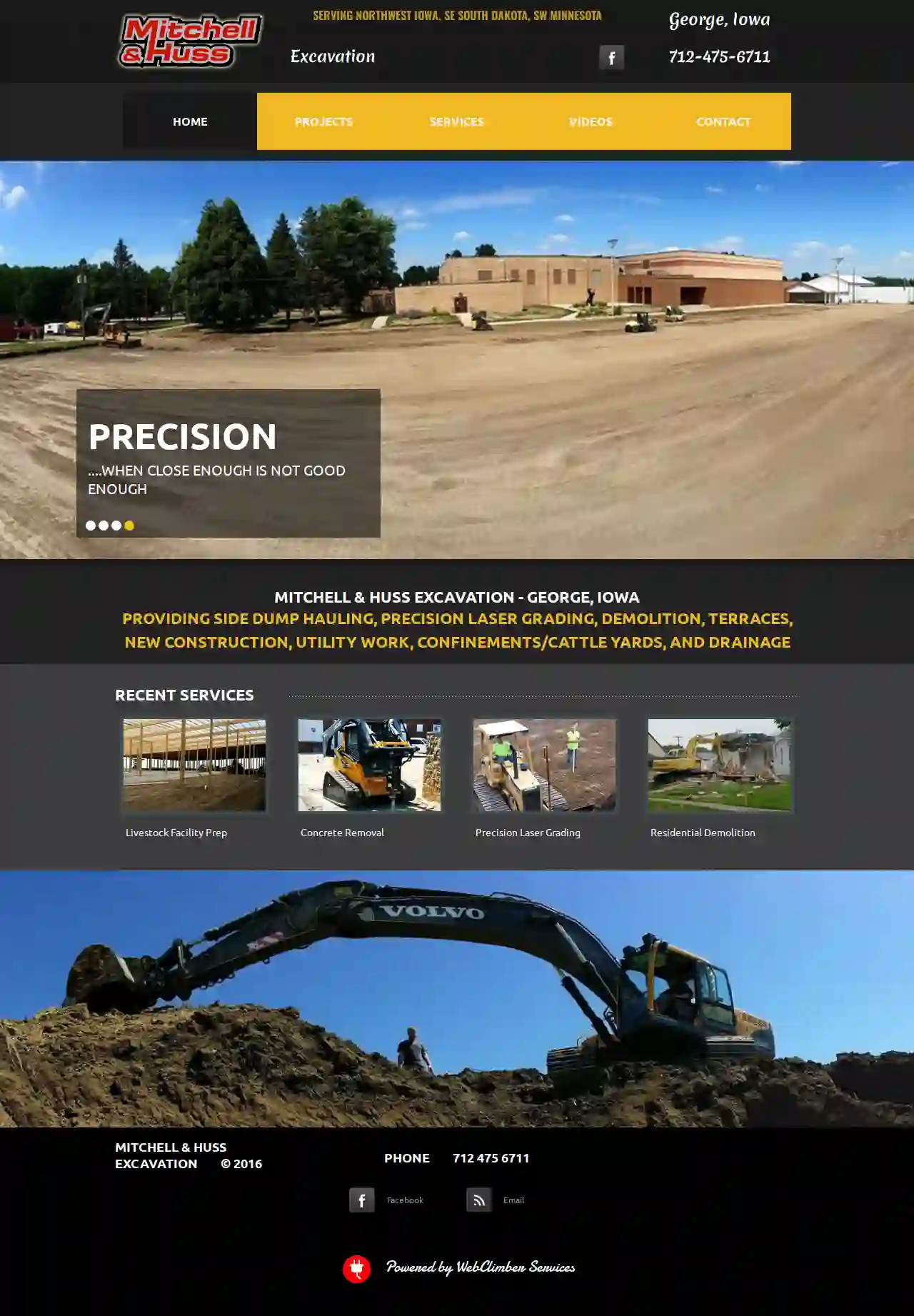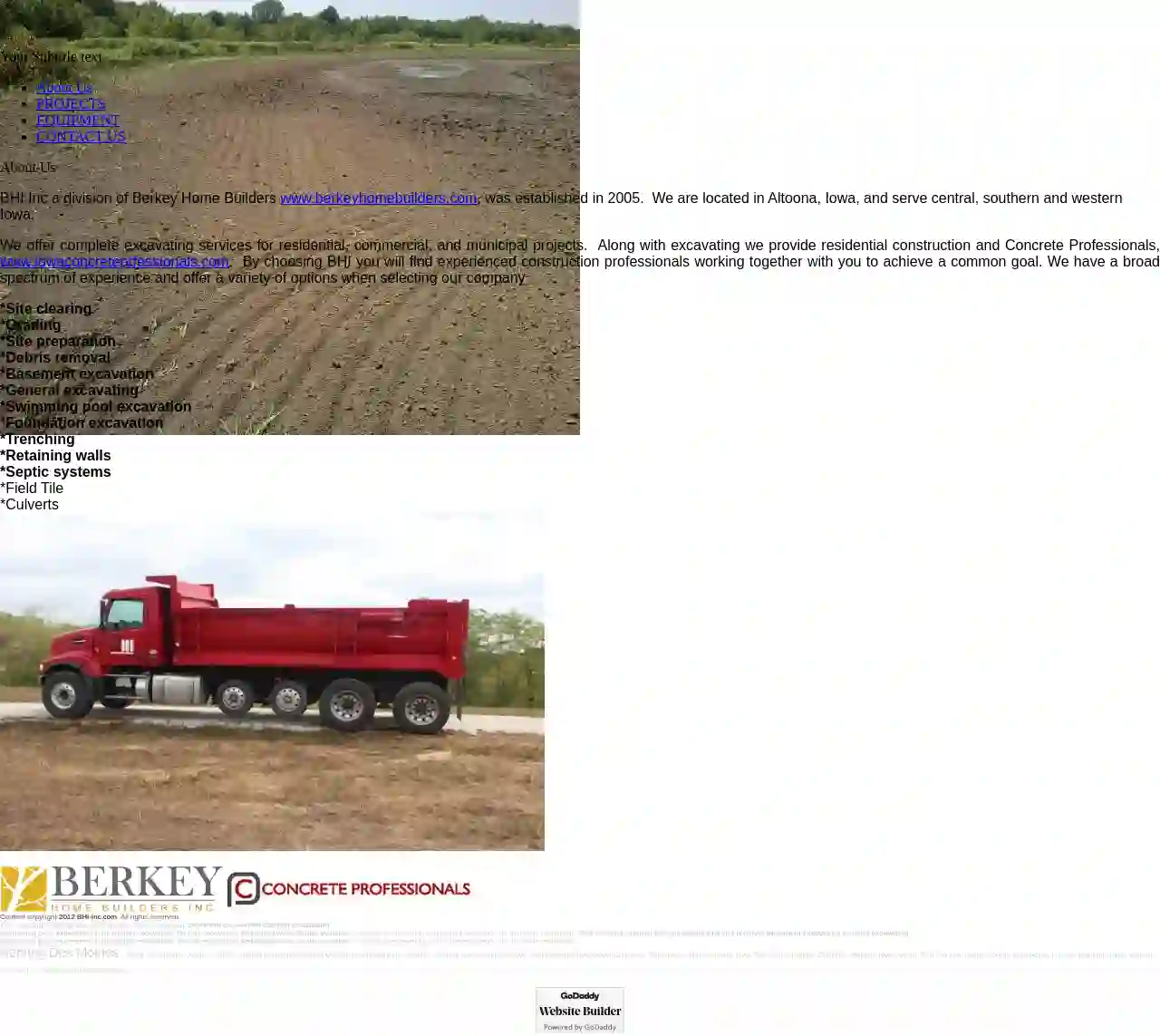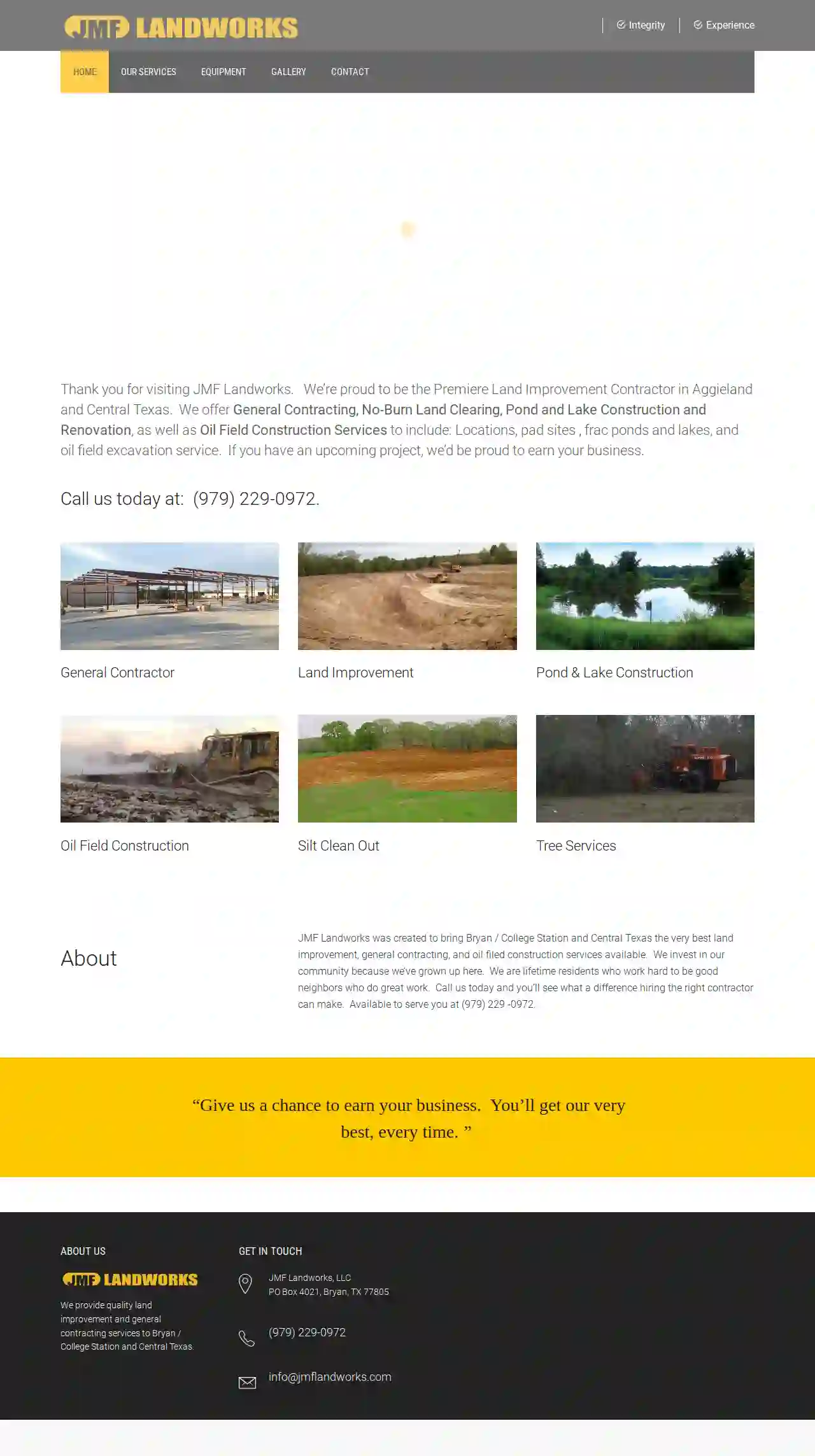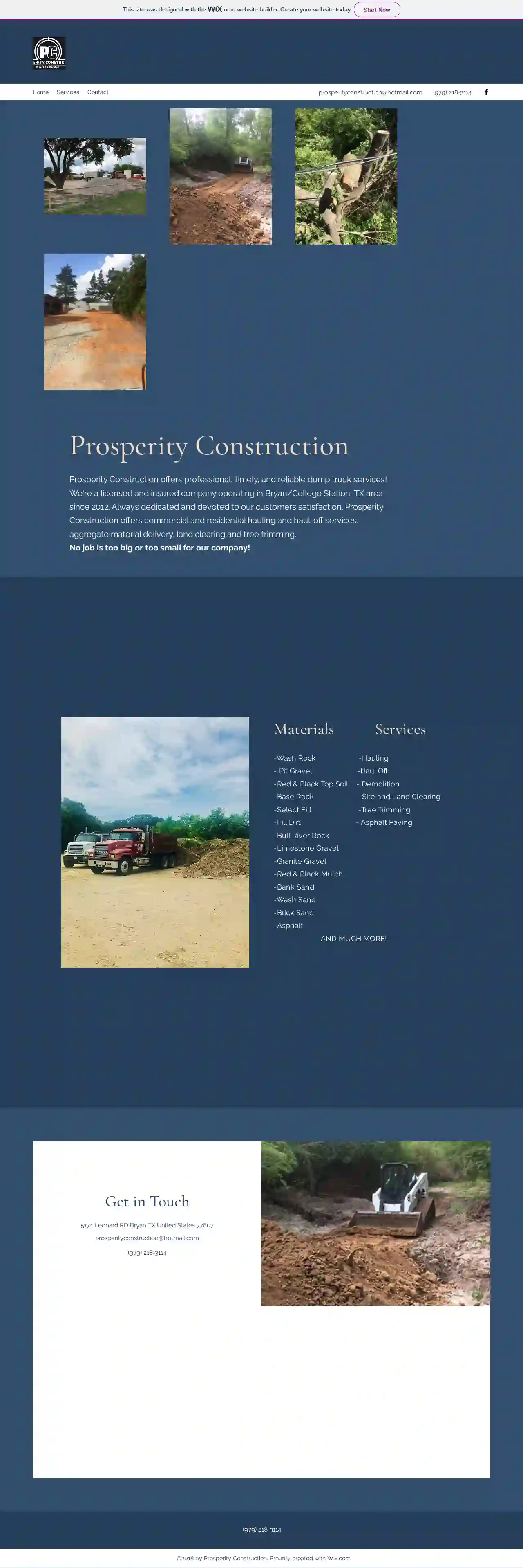Demolition Contractors Indianola
Best Demolition Companies in Indianola
Get multiple Structure Demolition quotes for your project today! Compare profiles, reviews, accreditations, portfolio, etc... and choose the best offer.

NE Iowa Excavating
1629 Lansing Harpers Road, Lansing, 52151, USNE Iowa Excavating: Your Trusted Partner for Excavation and Land Management in Allamakee County NE Iowa Excavating is a locally owned and operated excavating contractor serving Allamakee County and surrounding areas. We are committed to providing high-quality, reliable services at competitive prices. Our team of experienced professionals is dedicated to exceeding your expectations and delivering exceptional results. We offer a wide range of services, including: Excavating Grading Leveling Landscaping Rockscaping Trenching Bulldozing Pond Building/Restoration Food Plots Logging Roads Culvert Installation & Water Channeling Rockscaping, Hillside Terracing, & Retaining Walls Gravel Grading, Repairs, Leveling, & Snow Removal Whether you need a simple driveway installed or a complex site development project completed, we have the expertise and equipment to handle the job. We are committed to providing our clients with the highest level of service and satisfaction. Contact us today for a free estimate!
- Services
- Why Us?
- Gallery
Get Quote
Mitchell & Huss Excavation Inc.
52 reviews201 East Minnesota Avenue, PO Box 517, George, 51237, USMitchell & Huss Excavation: Your Trusted Partner for Excavation Services in Northwest Iowa Established in 2006, Mitchell & Huss Excavation has built a strong reputation for providing reliable and professional excavation services to clients throughout Northwest Iowa, Southeast South Dakota, and Southwest Minnesota. We are committed to delivering high-quality workmanship, exceeding expectations, and ensuring customer satisfaction on every project. Our team of experienced operators and skilled professionals is equipped with a fleet of modern equipment to handle a wide range of excavation needs, from small residential projects to large commercial developments. We take pride in our attention to detail, precision, and efficiency, ensuring that every project is completed on time and within budget. Whether you need site preparation, demolition, utility work, drainage solutions, or any other excavation service, Mitchell & Huss Excavation is your trusted partner. We are dedicated to providing exceptional service and building lasting relationships with our clients. Contact us today to discuss your project and let us help you bring your vision to life.
- Services
- Why Us?
- Gallery
Get Quote
WRH, Inc.
4.84 reviews1648 T Ave, South Amana, Iowa, 52334, USAbout WRH, Inc. WRH, Inc. is a General Contractor specializing in water treatment, wastewater treatment, flood mitigation, deep foundations, and EPC (Engineer-Procure-Construct) High Voltage Electrical Projects. We self-perform a large portion of our work, and partner with industry leading construction companies and material/equipment providers. This combination of efforts, in conjunction with an experienced team, allows us to provide superior single source infrastructure solutions. Our History In 1973, WRH, Inc. was founded as Wendler Engineering and Construction, by Glenn Wendler. The civil focused construction company was small but mighty, the company generated staying power as they dedicated themselves to safety, quality, honesty, and family. In 1998, Glenn Wendler retired and the company appointed Randy Reihmann as President. At that time the company had begun developing a well-rounded construction fleet, and had earned a well-known and well-respected reputation. In 2020, WRH, Inc. appointed Randy Reihmann as Chairman of the Board, and Jamie Rich took his place as President. Currently, WRH, Inc. has 100+ employees, a substantial and differentiated construction equipment fleet, a diversified labor force, a superior management team, and a wealth of industry experience and historical data. Our Mission Safely provide superior single source infrastructure solutions, mutually benefiting all parties involved. Vision Safely construct quality infrastructure which provides a sustainable future for those around us. Values Safety, Quality, Honesty, Dedication, Family
- Services
- Why Us?
- Gallery
Get Quote
Jenkins Excavating & Logging LLC
4.617 reviewsJenkins Excavating & Logging, LLC, P.O. Box 447, Culpeper, 22701, USJenkins Excavating & Logging LLC Serving Central & Northern Virginia Certified experts with 20+ years of experience. Contact us today to schedule our specialized services and work with our dedicated team. No job is too big or small! Jenkins Excavating & Logging LLC is a family-owned and operated business with over 20 years of experience in the excavating and logging industry. We are committed to providing our clients with the highest quality services at competitive prices. We are licensed, insured, bonded, and certified to operate in Virginia. We offer a wide range of services to meet the needs of our residential and commercial clients. We are also proud to be a sustainable harvesting and resource professional. We are committed to providing our clients with the best possible service and experience. We are dedicated to providing our clients with the highest quality services at competitive prices. We are also committed to providing our clients with a safe and efficient work environment.
- Services
- Why Us?
- Gallery
Get Quote
BHI-Inc
Des Moines, USAbout BHI Inc. BHI Inc, a division of Berkey Home Builders ( www.berkeyhomebuilders.com ), was established in 2005. We are located in Altoona, Iowa, and serve central, southern, and western Iowa. We offer complete excavating services for residential, commercial, and municipal projects. Along with excavating, we provide residential construction and Concrete Professionals ( www.iowaconcreteprfessionals.com ). By choosing BHI, you will find experienced construction professionals working together with you to achieve a common goal. We have a broad spectrum of experience and offer a variety of options when selecting our company.
- Services
- Why Us?
- Gallery
Get Quote
JMF Landworks
PO Box 4021, Bryan, 77805, USAbout JMF Landworks JMF Landworks was established to provide Bryan / College Station and Central Texas with the highest quality land improvement, general contracting, and oil field construction services. We are deeply invested in our community, having grown up here. As lifelong residents, we strive to be good neighbors and deliver exceptional work. Contact us today and experience the difference hiring the right contractor can make. We are available to serve you at (979) 229-0972. Our Commitment "Give us a chance to earn your business. You'll get our very best, every time."
- Services
- Why Us?
- Gallery
Get Quote
United Excavating & Land Development Inc.
51 reviews10607 Dumfries Rd, Manassas, 20112, USEXPERIENCE DEDICATION PROFESSIONALISM As a leading excavating company in the DMV area, United Excavating & Land Development Inc. specializes in providing our clients with a comprehensive approach to contracting. Since our establishment in 2013, we have been committed to fulfilling our clients' needs and ensuring their complete satisfaction. We offer a wide range of services, including land development, excavation, demolition, grading, land clearing, and sewer, storm and water installation for both commercial and residential projects. Contact us today to receive your free estimate and let us exceed your expectations with our unparalleled expertise and dedication to excellence.
- Services
- Why Us?
- Gallery
Get Quote
Juarez Excavating & Fiberglass pools
520 reviews1617 SW Ankney BLVD, Ankeny, USYou dream it! - We build it! Start by browsing our pool collection dream, design & build Looking to transform your space? Still dreaming about that pool? There is no place better then your own home, Imagine a paradise at home where you can enjoy life and create beautiful memories with your family and friends. Owning your own pool will ensure years of fun and laughter that will bring countless moments to remember, being surrounded by the ones you love. Now is the time to get on our schedule for the summer of 2024. Choose the pool of your dream from our pool collection & ideal sizes. Fill out & submit your contact information FINANCING IS NOW AVAILABLE POOL COLLECTION Our Annual🌴 Spring Sale 🌴 Take advantage of our exclusive spring sale and save thousands of dollars on your pool oasis. As we say goodbye to winter, now is the perfect time to explore our wide range of pools. Our annual spring pool sale offers unbeatable prices and incredible deals that are only available for a limited time this spring. Our team has carefully selected top-notch pool models specifically for this sale, ensuring that you have access to the best options on the market. SHOP now our pool packages that come complete with pool & concrete Don't miss out on this opportunity to transform your backyard into a summer oasis while keeping your budget intact.SHOP NOW Contact us today! Step 1. Get in touch with usOnce you are ready to transform your backyard start by signing up in the contact form, or calling us for a free quote! Step 2. Build We can design and once contract is signed we begin the process, We handle logistics & permits & scheduling. We Build you a perfect escape as swiftly as possible . Step 3. ENJOY The fun begins! Start by inviting over Friends & Family. Everyone will be excited to see your new backyard oasis! How It Works Our Story.. -Dream-We are the local leading central Iowa fiberglass pool Builders. Our mission is to create a space of joy & happiness for central Iowa Families & to make that process as simple as possible. We take pride of our work and strive hard every day to make that simple & possible. We offer the world’s most dynamic in-ground, composite fiberglass swimming pools installs, with state-of-the-art technology, designed and built with integrity, care and love. With years of experience you can rest assure your pool will be installed properly. Having your own pool will elevate your daily life and set the stage for years of creating beautiful memories. ABOUT US The APEX -Collection-The APEX Collection takes the concept of the popular full-width splash pad to another level with the marriage of a full-length bench along the right side. This provides the luxury of a spacious resort lounge area while also having the option of additional comfort the full length of your pool. You can enjoy relaxing in the shallow end or be active in the deeper end of the pool. This is contemporary design at its highest and most beautiful level. The APEX is available in three lengths (30, 35 and 40 feet) with a full width of 15’ 5”. THE APEX Finance Your Paradise GET QUALIFIED NOW Get personalized terms without impacting your credit.LEARN MORE "I personally highly recommend Juarez Excavating and Fiberglass Pools. From the very beginning they did what they said, said what they do. Their communication, execution, quality, and integrity is the bar of pool installation. We had them do everything (installation, landscaping, and electrical)" Brett Lippold This is what we do! At JUAREZ Fiberglass Pool's, we make the pool buying process as streamlined as possible, while still making it fun and exciting. We specialize in high quality award winning fiberglass pools, leading you every step of the way to your backyard oasis
- Services
- Why Us?
- Testimonials
- Gallery
Get Quote
Prosperity Construction
55 reviews5174 Leonard RD, Bryan, 77807, USProsperity Construction Prosperity Construction offers professional, timely, and reliable dump truck services! We're a licensed and insured company operating in Bryan/College Station, TX area since 2012. Always dedicated and devoted to our customers satisfaction. Prosperity Construction offers commercial and residential hauling and haul-off services, aggregate material delivery, land clearing, and tree trimming. No job is too big or too small for our company!
- Services
- Why Us?
- Gallery
Get Quote
SS Grading
2.811 reviews14706 Evershot Circle, Midlothian, 23112, USAt SS Grading, we offer high-quality residential and commercial Richmond landscaping services. We specialize in yard grading, tree removal, land clearing, excavating and hardscapes. Our residential and commercial clients enjoy top-notch, reliable service at reasonable pricing. SS Grading is the premier grading contractor for the Greater Richmond Metro Area and Virginia. We offer grading and excavating solutions for residential and commercial projects. SS Grading specializes in grading, site work and excavating services. We have the capability, experience, and personnel required for any grading and excavation project. We have been providing quality grading and excavating services for more than 10 years. Our reputation has been earned by providing customer satisfaction, quality work, and successful completion of grading projects. We also offer installation of erosion control measures and retaining wall construction services.
- Services
- Why Us?
- Gallery
Get Quote
Over 22,076+ Excavation Businesses registered
Our excavation experts operate in Indianola and surroundings!
ExcavationHQ has curated and vetted the Best Excavation Pros arround Indianola. Find a top & trustworthy contractor today.
Frequently Asked Questions About Demolition Contractors
- General Liability Insurance: Covers bodily injury or property damage to third parties caused by the contractor's negligence.
- Workers' Compensation Insurance: Provides benefits to workers injured on the job.
- Pollution Liability Insurance: Covers costs associated with environmental contamination caused by demolition activities.
- Professional Liability Insurance: Protects against claims of negligence or errors in professional services, such as demolition planning or consulting.
- Size and Type of Structure: The method should be suitable for the structure's size, height, and construction materials.
- Site Location and Accessibility: The method should be feasible given the site's location, surrounding buildings, and access constraints.
- Environmental Considerations: Prioritize methods that minimize environmental impact, such as deconstruction or selective demolition if feasible.
- Budget: Different demolition methods have varying costs, so choose one that fits your budget.
- Safety: Prioritize methods that ensure worker safety and minimize risks to surrounding areas.
What is the importance of insurance in demolition projects?
How can I tell if my building contains asbestos?
How do I choose the right demolition method for my project?
What is asbestos abatement?
What is the importance of insurance in demolition projects?
- General Liability Insurance: Covers bodily injury or property damage to third parties caused by the contractor's negligence.
- Workers' Compensation Insurance: Provides benefits to workers injured on the job.
- Pollution Liability Insurance: Covers costs associated with environmental contamination caused by demolition activities.
- Professional Liability Insurance: Protects against claims of negligence or errors in professional services, such as demolition planning or consulting.
How can I tell if my building contains asbestos?
How do I choose the right demolition method for my project?
- Size and Type of Structure: The method should be suitable for the structure's size, height, and construction materials.
- Site Location and Accessibility: The method should be feasible given the site's location, surrounding buildings, and access constraints.
- Environmental Considerations: Prioritize methods that minimize environmental impact, such as deconstruction or selective demolition if feasible.
- Budget: Different demolition methods have varying costs, so choose one that fits your budget.
- Safety: Prioritize methods that ensure worker safety and minimize risks to surrounding areas.